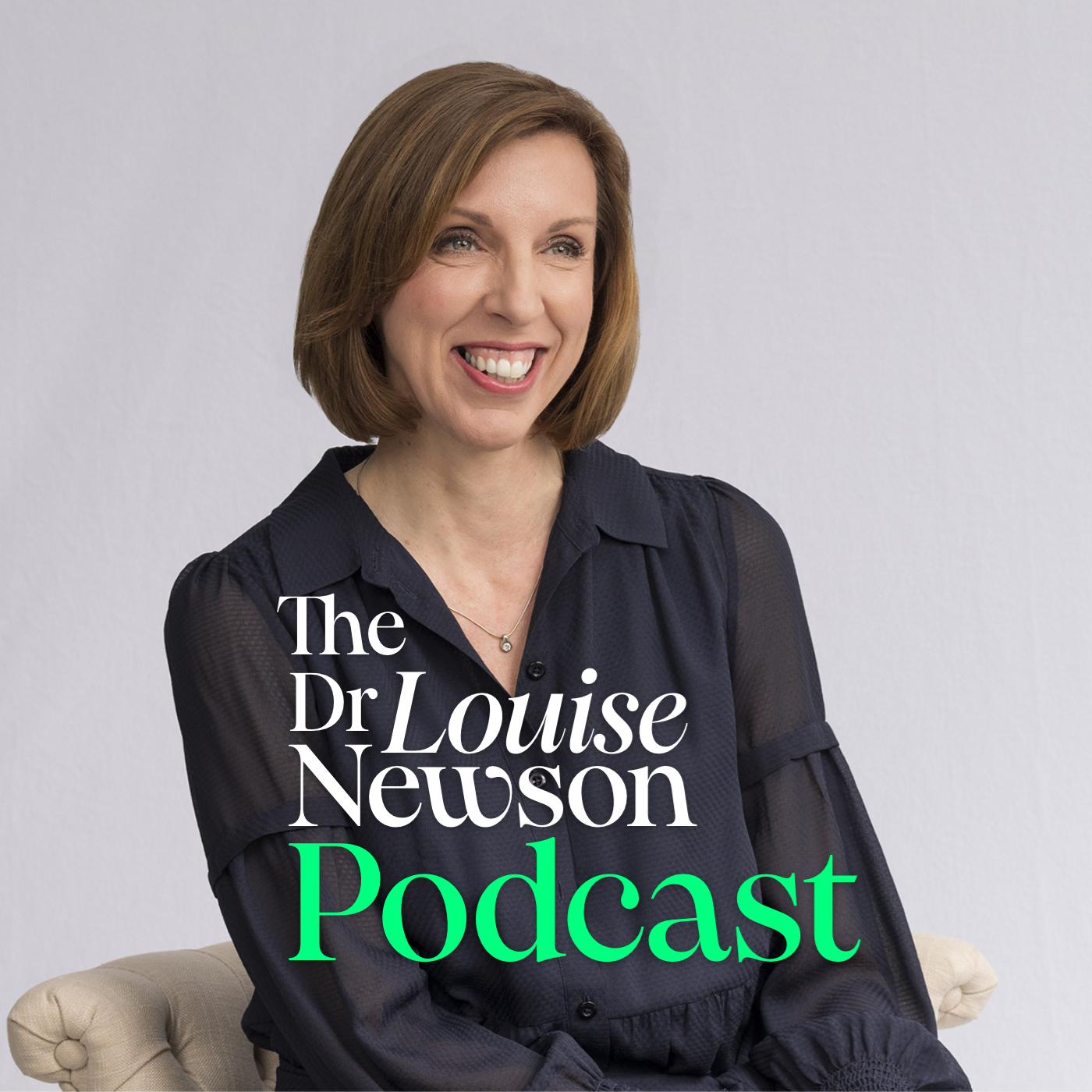
8.5M
Downloads
311
Episodes
Dr Louise Newson is an award-winning physician, respected women’s hormone specialist, educator, and author committed to increasing awareness and knowledge of perimenopause, menopause, and lifelong hormone health. Each week, Louise dives into the newest research, treatments and hot topic issues, providing accessible, evidence-based information to empower your future health. Joined by fellow experts and special guests, with answers to your burning questions, Louise explores how hormones impact every aspect of our lives. Described as the “medic who kickstarted the menopause revolution”, Louise aims to empower a generation of women to have a greater understanding, choice and control over their treatment, bodies, minds and future health through their hormones. She is the creator of the award-winning free balance app, a Sunday Times bestselling author and the founder of the Newson Health clinic. With over three decades of clinical experience, Louise is a member of the Royal College of Physicians, a Fellow of the Royal College of GPs, a Visiting Fellow at Cambridge, a regular contributor to academic journals including the Lancet and the British Journal of General Practice, and has been awarded an honorary Doctorate of Health from Bradford University. DISCLAIMER: The information provided in this podcast is for informational purposes only and is not intended as a substitute for professional medical advice, diagnosis, or treatment. Always seek the advice of your physician or other qualified health providers with any questions you may have regarding a medical condition. The views expressed by guests are their own and do not necessarily reflect the views of Dr Louise Newson or the Newson Health Group.
Episodes
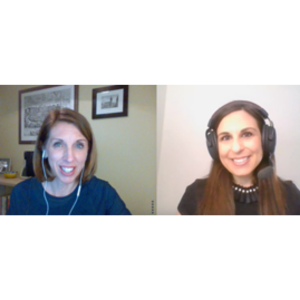
Monday Mar 29, 2021
Monday Mar 29, 2021
In this episode, Dr Newson has a lively discussion with Heather Hirsch, the Clinical Programme Director for the Menopause and Midlife Clinic at Brigham and Women’s Hospital in Boston. Heather was shocked to see, during her fellowship, that what was being taught about menopause principles and care was actually wrong and realised that menopause was the biggest gap in women’s healthcare across America.
The experts discuss the problem of unregulated compounded bioidentical hormones and the reasons why 2-3 thirds of American women use this type of non-approved hormone treatment, rather than FDA approved body identical HRT that is prescribed by doctors in the UK. They reflect on the shift away from using HRT over the last 2 decades, and the devastating consequences to women’s health because of this, and offer practical advice on how to educate other healthcare professionals to unlearn the pervasive myth that estrogen is dangerous.
Heather’s three take away messages are:
- Medical students should spend time with a menopause doctor and see how they help women.
- Menopause care is a team effort and a global effort; everyone has to come together.
- Tell a friend, colleague or family member about evidence-based sources of menopause information such as podcasts, youtube channels, or social media. Help spread the truth about HRT.
IG @hormone.health.doc
Website: heatherhirschmd.com
YouTube: Health by Heather Hirsch
Podcast: Women's Health by Heather Hirsch
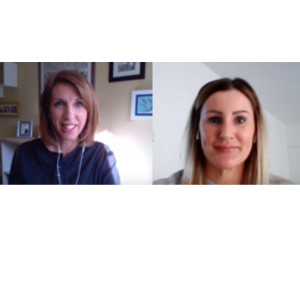
Monday Mar 22, 2021
091 - Being Young & Menopausal - Hayley Etherington & Dr Louise Newson
Monday Mar 22, 2021
Monday Mar 22, 2021
In this podcast, Dr Louise Newson chats to Hayley Etherington, a young woman who has been menopausal since the age of 14.
Hayley talks openly with Dr Newson about her experience and how, even though she was given HRT as a teenager, she has been struggling with many different symptoms for so many years. Hayley's GP didn't make the connection between her symptoms and her menopause diagnosis and never suggested that she may be on the wrong type or dose of HRT.
Since having a virtual consultation with Dr Newson at the Newson Health clinic, Hayley is now on a new regime of HRT and says she feels like a new person, one who feels well and is full of energy.
Hayley has decided that now is the time to speak out about her premature menopause which she held inside for 25 years, in the hope that it may help others who are experiencing something similar.
Hayley's Three Take Home Tips:
- You know your body - not the doctor. Be persistent if you feel you are not getting the right help.
- Get a second opinion, try other GPs or see a menopause specialist if you can.
- Find your tribe of ladies. There is support out there for you - you are not alone.
Follow Hayley on Instagram: @prematuremenopause14
Read Hayley's blog: https://hayleysmenopause14.blogspot.com/
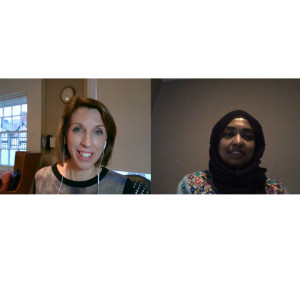
Monday Mar 15, 2021
Monday Mar 15, 2021
In this episode, Dr Louise Newson talks to Rushna Mia about her menopause experience and how she is aiming to increase awareness of the menopause and support for women and their families within her local Asian community.
Rushna works in a primary school, is a busy mother of 4, grandmother of a 3-year-old and helps run her family’s businesses. She is passionate about supporting women within her community and takes a lead in various women’s groups. Rushna describes the particular issue of the menopause as a taboo within Asian communities and says it is mostly swept under the carpet and not spoken about.
It took Rushna around 8 years to recognise that the symptoms she was experiencing were due to the menopause and the doctors she saw did not raise this possibility either. After seeing Dr Sarah Ball at the Newson Health Menopause and Wellbeing Centre and feeling so much better on the right treatment, Rushna now wants other women to know the right help is available.
Rushna's Three Take Home Tips:
- Use social media, there’s lots of free information out there that can be really helpful regarding your symptoms.
- Speak to your GP or try the Nurse again, ask if there are any local women’s groups.
- Women should work together to help other women and their families. It's important that everyone knows that help and support is available.
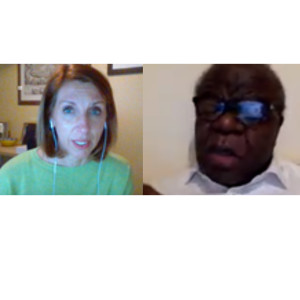
Monday Mar 08, 2021
089 - The Benefits of HRT - Professor Isaac Manyonda & Dr Louise Newson
Monday Mar 08, 2021
Monday Mar 08, 2021
Professor Isaac Manyonda is a professor of obstetrics and gynaecology at St George's Hospital in London with a major interest in the menopause.
In this very detailed discussion, Prof Isaac and Dr Newson talk about the huge benefits of oestrogen in HRT and how many ways oestrogen can improve future health and prevent disease. They discuss the misinformation and misunderstanding of HRT over the last 20 years and how this has led to so many women being inappropriately denied HRT.
Prof Isaac also speaks very eloquently about the perceived risks of HRT and also how oestrogen on its own can lead to a lower future risk of developing breast cancer and also dying from breast cancer. Dr Newson says that the information discussed in this podcast is evidence based and it is essential that all women listen carefully!
Professor Isaac Manyonda's Three Take Home Tips:
- HRT prevents many of the health problems that women can develop after the menopause and it does so in a very simple, cheap and effective way.
- In terms of the menopausal symptoms that women often experience, there is no better intervention than HRT.
- Here is a hormone that is essentially like 'magic bullet' - it really can help improve quality of life.
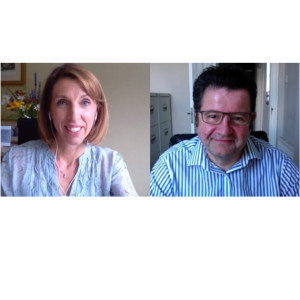
Monday Mar 01, 2021
088 - Endometriosis and the Menopause - Chris Mann & Dr Louise Newson
Monday Mar 01, 2021
Monday Mar 01, 2021
In this podcast, Dr Louise Newson is joined by Chris Mann, a consultant gynaecologist and one of the world's leading experts in endometriosis. Chris has received extensive training in many countries in the surgical treatment of endometriosis from some of the world's leading laparoscopic surgeons. He talks to Dr Newson about this condition, which affects around 10% of women and explains how, for many women, it takes seven years for a diagnosis. Far too many women do not seek medical help and those that do are often dismissed and given inappropriate advice or treatment.
Chris and Dr Newson talk about the different treatment options available for endometriosis and how women with endometriosis can be given different types of HRT during the perimenopause and menopause. He recommends that any woman who is not receiving adequate help should persevere and see another doctor.
We are releasing this podcast the first week in March to coincide with Endometriosis Awareness Month. Taking place across the world, Endometriosis Month exists to help increase awareness and highlight the symptoms of this debilitating condition that affects an estimated 176 million women worldwide.
Chris Mann's Three Take Home Tips:
- If you suspect that you may have endometriosis and the symptoms are negatively impacting your life then please seek help. Too many women suffer in silence.
- If you are not getting anywhere with your GP then you can ask for a second opinion. If you still are not getting the right help then book a private consultation with a specialist, if you can afford it. A specialist can then write to your GP and advise them on your treatment going forward.
- Don't give up! For too long, too many women have been fobbed off. It isn't something to just 'put up with' and there are now more of us out there that want to help.
Visit Chris Mann's website: https://www.theendometriosisclinic.com/christopher-mann/
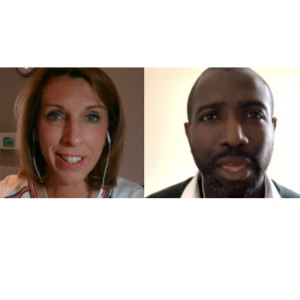
Tuesday Feb 23, 2021
087 - Menopause Education for GPs - Dr Tosin Taiwo & Dr Louise Newson
Tuesday Feb 23, 2021
Tuesday Feb 23, 2021
In this episode, Dr Louise Newson is delighted to chat to Dr Tosin Taiwo who is a doctor currently in his third year of GP training. Dr Tosin has an orthopaedic background as he used to work as an orthopaedic registrar before changing to general practice. Since beginning his training as a GP, Dr Tosin has developed a keen interest in lifestyle medicine.
Dr Tosin discusses menopause education for GPs and how much he learnt from Dr Newson's 'Confidence in the Menopause' online education programme with FourteenFish. He feels like it should be renamed the “epiphany video”!
Despite his busy career in General Practice, Dr Tosin also hosts his own Podcast series, called 'Dr Tosin's Podcast - Healthy Living Beyond Medicine.'
Dr Tosin's Three Take Home Tips for fellow GPs in training:
- Watch Dr Newson’s 'Confidence in the Menopause' video in the FourteenFish programme
- HRT reduces the future risk of Cardiovascular disease in women who take HRT, within 10 years of the menopause, by up to 50%
- Always have perimenopause/ menopause in mind when seeing women in their mid 40s, especially those that present with non-specific symptoms or 'tired all the time' symptoms
Listen to Dr Tosin's Podcast here
Find Dr Tosin on Instagram: @dioscuri2
YouTube: Dr Tosin
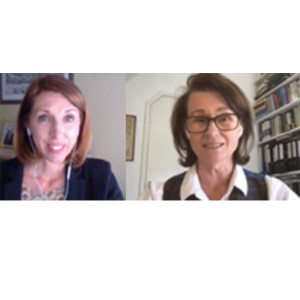
Monday Feb 15, 2021
086 - Lockdown & Weight Loss - Emma Ellice-Flint & Dr Louise Newson
Monday Feb 15, 2021
Monday Feb 15, 2021
In this episode, Dr Louise Newson and Newson Health nutritionist, Emma Ellice-Flint discuss habits that might help with weight loss and general weight balance.
During the UK’s third lockdown, many women are finding it difficult to feel motivated to exercise and eat well. Many are having to home school their children; some are working harder than ever due to the pandemic. Plus the UK’s winter weather discourages outside exercise and movement.
Dr Newson and Emma discuss what a woman might do to try and help herself during this time. In particular they discuss the link between what a person eats and their mood and energy. Emma talks about prebiotic foods that help to feed the good gut microbes, such as rocket, garlic, onion, leek and more. They also discuss some healthy eating ideas and meals that the kids/teens at home might like too!
Emma's Three Take Home Tips for Weight Balance:
- Avoid snacking in the evenings - Eat a satisfying evening meal so that the craving for snacking into the evening is less. The habit of evening snacking is more likely to lead to weight gain, than at any other time.
- Avoid alcohol - Drinking alcohol regularly can contribute to weight gain.
- Where possible, try to make your own food rather than buy in pre-prepared food. This way you can be in control of what exactly goes into your meals.
Emma is a Nutritionist and former chef. She works at Newson Health seeing clients for nutrition/food, weight balance and gastrointestinal health related issues. She runs monthly online food and health workshops, plus she shares her recipes regularly on social media and on her website.
Find Emma on Instagram here: @emmas_nutrition
Facebook: @emmasnutrition
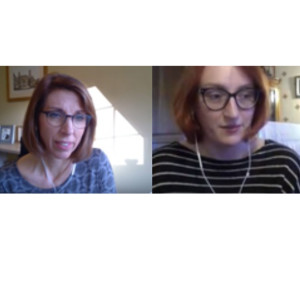
Monday Feb 08, 2021
085 - Medical Menopause - Emma McAuley & Dr Louise Newson
Monday Feb 08, 2021
Monday Feb 08, 2021
In this episode, Dr Louise Newson is joined by Emma McAuley, a young woman who was thrust into a medical menopause at age 24, after undergoing treatment for breast cancer.
Emma speaks openly to Dr Newson about her experience and how she was told very little about the menopause before her treatment. Emma expected a few hot flushes and instead experienced a vast range of menopause related symptoms and issues.
Dr Newson and Emma also discuss their first meeting at an event held by young adult cancer support charity, Trekstock. Dr Newson was speaking at the event, titled 'Lifting the Lid on Cancer and the Menopause' and Emma talks about the effect it's had on her to finally feel safe enough to ask questions and be able to get the correct advice.
Emma's Three Take Home Tips:
- In terms of hot flushes - layers are your friend! Even in the winter, wear items that are easy to take off and put back on.
- Speak to everyone you can - whether that's your peers or a medical professional. Knowing you are not alone can be a huge help.
- Even though other people around you may be complaining about their periods - it's okay to miss having your own. Talk to your friends about how you are feeling.
Take a look at this booklet from Dr Newson - 'A Young Woman's Guide to Menopause After Treatment for Cancer'
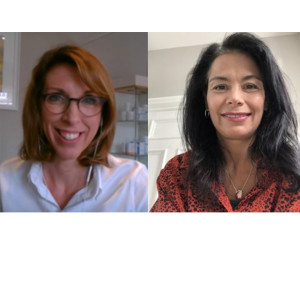
Monday Feb 01, 2021
084 - Menopause and Health - Dr Annice Mukherjee & Dr Louise Newson
Monday Feb 01, 2021
Monday Feb 01, 2021
Dr Annice Mukherjee is a U.K. hormone specialist with almost 3 decades of experience in hospital medicine. From the early days, her specialism in hormones has always focussed on optimising quality of life in hormone diseases, imbalances and deficiencies. Her knowledge helped her hugely when she went through an early menopause due to a cancer diagnosis ten years ago.
Annice is the author of “The Complete Guide to the Menopause” which is hot off the press, having been published by Penguin Random House on 28th January.
In this episode, Dr Newson and Annice discuss how different hormones in the body interact with each other and the importance of using holistic approaches in managing menopause alongside HRT, as well as for those of you who do not take it. She emphasises that in the context of today’s world, lifestyle approaches are all the more important and should be adopted by every women in menopause to optimise wellbeing and long-term health.
Annice’s Three Take Home Tips:
- Menopause affects every system in the human body and all hormones interact with each other. Improving your overall health can help with hormone balance and your menopause experience. Understanding how to do this is key.
- Stress is more prevalent and relentless in today’s world and acknowledging and addressing your stress, even with tiny lifestyle tweaks, downtime and applying selfcare can be transforming, both in terms of menopause symptoms and your overall health.
- Exercise, good nutrition, good sleep habits, stress management and some complementary therapies can work as well as, or better than the many of the alternatives to HRT and don’t have any of the down sides or side effects.
You can buy Annice’s book here: https://linktr.ee/annicemd
Find Annice on Instagram: @the.hormone.doc
Facebook: @thehormonedoc
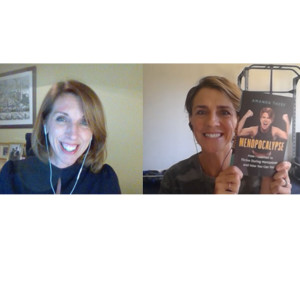
Monday Jan 25, 2021
Monday Jan 25, 2021
Amanda Thebe is a personal trainer and nutrition coach, with nearly 3 decades in the health and wellness industry. She is the author of 'Menopocalypse: How I Learned To Thrive During Menopause and How You Can Too!' Dr Newson actually helped Amanda with the HRT chapter in the book. Amanda (who is British) joins Dr Newson from her home in Texas, USA.
In this episode, Dr Newson and Amanda discuss how menopause awareness differs across the Atlantic, yet despite our different medical organizations, women still are not being helped through menopause. Women are still being dismissed by doctors or misdiagnosed, so there is still much work to do. As well as a discussion about the role of HRT in menopause management, they discuss the importance of lifestyle changes that are integral to supporting menopause and bulletproofing women into aging against the major diseases like diabetes, CVD, osteoporosis and Alzheimers.
They also discuss:
- Living a movement based life vs a sedentary life.
- Knowing there is an entry point into exercise for everybody.
- Making small changes that develop into lifelong habits.
- Simplifying nutrition to support your body.
- Cutting through misformation in the health and wellness world
- Adding things of benefit rather than deprivation and restriction.
Amanda Thebe's Three Reasons to Buy Her Book:
- It's giving you knowledge and knowledge is power!
- There is a 12 week strength training programme in the book - it's great for during lockdown.
- The book contains advice on how to age resiliently. This is about how to live your life based on your strengths!
Buy Amanda's book 'Menopocalypse' here: www.fitnchips.com/books/
Find Amanda on Instagram: @amanda.thebe
